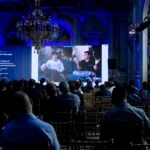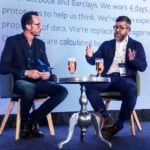How blockchain and artificial intelligence can change the way we work
At BBVA Open Summit, Ricardo Forcano, BBVA's Global Head of Talent and Culture; and Rob Brown, Global CMO (Chief Marketing Officer) at BBVA, chatted with the representatives of two startups that are working to leverage blockchain and AI technologies to enable new decentralized ways of working.

Via video conference call from the small Swiss city of Zug, 18 miles outside Zurich, BBVA’s global head of talent and culture Ricardo Forcano, interviewed Jorge Izquierdo, co-founder and CTO of Aragon, a startup that aims “to ‘disintermediate’ the creation and maintenance of organizational structures by using ‘blockchain technology.”
The video call, which was streamed live during the event, demonstrated how disruption can also impact the way companies are run. At just 21, Izquierdo is already one of the most experienced authorities in the Ethereum ecosystem and "a leading expert in decentralized organizations," said Forcano.
His company is developing a digital infrastructure with the goal of facilitating the creation of decentralized autonomous organizations (DAOs). With this new platform, Aragorn wants to offer the tools required to manage the governability, accounting, financing and other key areas of this new organizational model.
What is a decentralized organization?
"Companies as we know them are comprised of people who build and offer services for other people to consume. Capital becomes an intermediary: investors put in capital so that on one hand the company can charge customers for the service, and on the other it can compensate the employees for their work.” explained Forcano.
As opposed to this model, what decentralized organizations do is “disintermediate the capital” putting suppliers or manufacturers of the product in direct contact with consumers using a predefined protocol where the value is logged in a token. "This allows the community to interact directly without needing an agent who intermediates.” added BBVA’s head of talent and culture.
One of the first examples of this operating model is Bitcoin: "It doesn’t have a CEO or employees or a headquarters, but the organization has been running for 10 years thanks to an incentive system that compensates the community for its work and fosters decision making in the interest of the ongoing running of the protocol.” explains Izquierdo.
Aragon operates in a very similar way: it has created a community of software developers who participate in the company by means of an incentive system based on tokens, and now the company is working on developing solutions that will enable other companies to adopt these organizational models. "We want to facilitate the creation of organizations in which people can decide the incentive system and the way people can collaborate between themselves to create a service.” he adds.
For example, one of the alternative governance models that they are exploring through Ethereum is the concept of liquid democracy. This system is based on giving the organization's members the option of voting directly in the decision making process or delegate their votes to experts in specific areas where in which they may lack a minimum level of knowledge.
“The most interesting thing about what you are doing is the opportunity to explore and design new models of corporate governance.” explains Forcano, who stressed that the greatest challenge lay in giving communities the power to “govern, make decisions, and decide how the organization will grow in the future” by themselves.
The next step: autonomy
Payday represents an example of automation at Aragon: the organization has created a decentralized application that allows each employee to set their specific payday, thereby doing away with having to rely on a person to “cut the checks” each month. “It is a good example that illustrates the transparency of the rules that govern a decentralized organization and the system’s efficiency in eliminating the friction and bureaucracy associated to administrative tasks,” says Forcano
The next step after 'decentralizing' the way of working through software is automating these decisions so that the organization can run itself autonomously. The idea is that, once they are agreed on in accordance with the chosen governance model, the rules can be hardcoded into ‘smart contracts' and recorded in the blockchain, allowing the organization or company to function autonomously.
In fact, Aragon has set up the Aragon Foundation to nurture the project in its early phase. The Foundation intends to lose almost if not all its power in the future, “and to disappear, if possible.” The goal is to, in the long run, transfer all its power to the token-owner community.
A chatbot to manage vacations
After the video interview, Ron Brown, BBVA Global CMO (Chief Marketing Officer) sat down with Chris Downs, CEO of Normally, a data product and service design studio took to the BBVA Open Summit stage to discuss how the company is exploring new tech-enabled internal organization models.
Normally solves complex design problems for some of the world’s largest organizations including the BBC and Facebook, and has developed mechanisms to automate specific employee time and resource management processes. In their case, thanks to artificial intelligence. “Our employee’s salaries are calculated by an algorithm,” explains the CEO.

Rob Brown (BBVA) and Chris Downs (Normally) during BBVA Open Summit.
Thus, explained Downs, we are able to guarantee the transparency and fairness of the system, replacing subjective criteria with the assessment of workers’ objective skills and capabilities. Also, the company’s employees only work four days a week —“they can organize their own time freely”— and rely on a chatbot to decide if an employee can take a few vacation days off or not.
“It is much more efficient than delegating the decision on an individual: the system takes into account the available data on the employee and the company to make the best decision,” he says.
“To change the way we work we need to change corporate cultures, and this begins with leadership attitudes, who must always put their teams’ interests ahead of theirs,” concludes Downs.